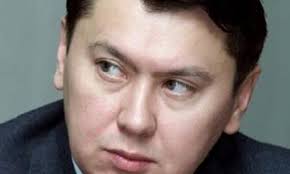 Rakhat Aliyev experienced the sort of career that is only possible in autocratic regimes; where blood is thicker than water, and where whom you know is infinitely more important than anything you may have learned. A one stage his CV glistened with the sort of plum jobs only available to those with contacts, but by the time of his death at 52 his downfall was complete. He died in an Austrian prison cell awaiting trial for murder, a charge his supporters say was politically motivated.
Rakhat Aliyev experienced the sort of career that is only possible in autocratic regimes; where blood is thicker than water, and where whom you know is infinitely more important than anything you may have learned. A one stage his CV glistened with the sort of plum jobs only available to those with contacts, but by the time of his death at 52 his downfall was complete. He died in an Austrian prison cell awaiting trial for murder, a charge his supporters say was politically motivated.
Aliyev was born in what was then Alma-Ata, capital of the satellite Kazakh republic in the Soviet Union, before it was renamed Almaty. As with many who made money after the collapse of the Soviet Union – and he made millions of dollars – Aliyev found himself in the right place at the right time. In 1982 he married Dariga Nazarbayev, the daughter of Nursultan Nazarbayev, who two years later would become prime minister of Kazakhstan and subsequently its president. Nazarbayev remains a dictator's dictator, and aged 74, still wins sham elections with the sorts of majorities that would embarrass the likes of Robert Mugabe.
The marriage proved to be Aliyev's making: when resource-rich Kazakhstan became an independent state on Christmas Day 1991, his influence soared and he became one of the most important people in Nazarbayev's inner circle. At various points he was head of the Almaty tax police – a position he used to pursue enemies and which ultimately played a role in his downfall – and deputy chief of Kazakhstan's national security committee.
In business circles he was known as "Sugar", thanks to his control of Kazakhstan's sugar industry, and he had interests in banking, oil refining, the media, telecommunications and agricultural commodities. In the years following the turn of the century he was worth hundreds of millions of dollars, if not more.
But if Aliyev was getting rich through his relationship with Nazarbayev, it was not because the two men were personally close. Until 2007 the president tolerated rather than feted him. Twice, in 2001 and 2007, he was despatched to Austria as Kazakhstan's ambassador, both at times of particular enmity between the two.
Nazarbayev was generally thought to be unimpressed with his son-in-law, but he became positively angry in the late 1990s when the Kazakh prime minister, Akezhan Kazhegeldinov, announced that he would stand against Nazarbayev in forthcoming elections. Typically he was run out of the country, but attempts by Aliyev to conduct a smear campaign against him backfired when a number of Nazarbayev's own assets were frozen by Belgian authorities after Aliyev asked them to investigate Kazhegeldinov.
In 2004 Aliyev's mistress Anastasiya Novikova, a 23-year-old presenter on Kazakh television, fell to her death from a flat in Beirut. She was buried in Kazakhstan but her family has continued to campaign and believe that she was murdered. True or not, the allegation was another stain on Aliyev's record.
His luck ran out in 2007 when two executives at Nurbank, a bank owned by Aliyev, disappeared. The bodies of Abilmazhen Gilimov and Zholdas Timraliyev were discovered at a rubbish dump on the outskirts of Almaty in 2011; soon after their disappearance, Aliyev and Dariga Nazarbayev were divorced.
Following the disappearance of the bank executives Aliyev had joined critics of the president after he signed a constitutional amendment effectively making him president for life. Aliyev claimed that Dariga had been forced to agree to divorce him by her father in revenge for his criticism and even claimed that his own signature had been forged on the documents.
An Austrian court refused Kazakhstan's request to extradite Aliyev in 2007, deciding that he would not get a fair trial. That did not stop the Kazakh courts sentencing him in absentia to 40 years for kidnapping, treason and plotting against his former father-in-law.
Aliyev married again, to his former secretary, an Austrian national, through whom he received an EU passport, and moved to Malta, and then Cyprus. After his diplomatic immunity was removed by the Kazakh government, countries including Germany, Austria and Malta, opened fraud investigations.
Last year he handed himself in to the Austrian police, who had begun a new investigation into the murder of the two bankers. Aliyev was remanded in custody, ahead of a trial in Vienna, which had been expected to begin this year.
Before justice could catch up with Aliyev he was found hanged in his cell. He had not shared the cell with other inmates. Prison officials said his death was "clearly suicide", adding that it was impossible for anyone to gain access to his cell. Aliyev's lawyer disagreed. Klaus Ainedter said he had seen his client a day earlier and that there as no sign that he was suicidal. Moreover, he argued, prison officials had put Aliyev on a "green list" of prisoner considered the least likely to kill themselves.
Aliyev had been due to testify at the trial of other inmates he said had threatened to kill him, which adds to the mystery of the man whose death proved no less colourful than his life.
ALISTAIR DAWBER, Friday 27 February 2015
Rakhat Aliyev, businessman and diplomat: born 10 December 1962; married 1982 Dariga Nazarbayev (divorced 2007; three children), secondly Elnara Shorazova; died Vienna 24 February 2015.




